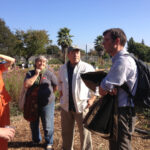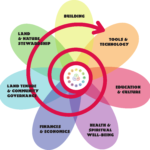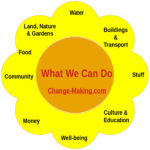The New Future
Environmental Change-Makers embarks on many new projects, large and small, designed to help put in place the infrastructure needed for the post-petroleum era. Projects have included group purchasing, lending libraries, political resolutions, and aspects of the new economy.
At the Environmental Change-Makers, each of our projects is designed to put in place solutions which will help prepare our community for what we call “the triple crisis”: climate change, the end of cheap oil, and long-term economic contraction.
Transition
The word “transition” means change. The Environmental Change-Makers are part of the international Transition movement. It is made up of grassroots people, like you and me, who have embraced the idea that society is changing in a very big way.
The Transition movement acknowledges that we have crossed the “peak” with respect to many resources and ecological systems. The movement declares that we must take the vast creativity and ingenuity which built this enormous ascent of energy and consumption, and apply that creativity to designing a peaceful descent – a powerdown.
The international Transition Network now counts local initiatives in most countries of the world. In 2008, the Environmental Change-Makers brought trainers from the UK to Los Angeles, thus helping launch several local Transition groups around Southern California.
Environmental Change-Makers continues to be a voice of the Transition movement here in L.A., and to connect people with resources to further these ideas.
More at the Transition Los Angeles website.
Powerdown
Powerdown refers to decreasing your energy consumption overall. Given that world energy supplies are decreasing, powering-down your lifestyle is an absolute necessity.
Consider all the ways you currently use energy. I’m using energy to write this post on my computer. It took energy to make the computer. The airplanes at nearby LAX airport use energy, as do the cars on L.A. freeways. Our society uses energy in agriculture to run tractors and combines, in industry to run forklifts and bobcats.
To bring your food to conventional supermarkets, trucks use energy. So do the air-conditioned warehouses operating behind-the-scenes. Most office buildings and schools use energy for heating, ventilation, and air conditioning. Energy runs fire trucks, ambulances, hospitals, and the sophisticated laboratories that make conventional medications.
We use energy in frivolous ways too. They’ve put timers in kids’ toothbrushes. Most contemporary appliances involve some energy‑consuming component. Cargo ships haul opulent quantities of consumer goods from manufacturing plants on far-away continents. We now regard the latest cell phone gadget as a “must-have essential.”
Peak oil / peak everything means that most of those uses of energy are about to end. Those that do remain will be quite restricted. The severe constriction of our energy supply which is on the horizon dictates that we become far, far wiser about the places we chose to use energy. And global warming says we’d better make that (inevitable) shift immediately if not sooner.
Powerdown means becoming aware of all the places you use energy and systematically eliminating them. Rather than an electric juicer with unrepairable plastic parts, the next time it breaks buy a durable manual metal one that will serve your family for several generations. When making home repairs, install operable windows, design for cross-ventilation, and choose manual drapes to control temperature.
Powerdown practices include manual tools, mechanical devices, and learning the skills of self-sufficiency. Get your bicycle back into repair. Build your muscles for walking, biking, lifting, growing food and carrying water.
Get to know your neighbors. Move close to family, if you want to see them often. As the post-peak era unfolds, the people you’ll be socializing with and working with will be those who live nearby.
Help your local community understand peak oil and plan for it. Fight energy-oriented build-outs such as airport expansions and new freeways. Plan for low-energy food production, low-energy water supply. In a nutshell, powerdown means preparing for the realities of the new future.


